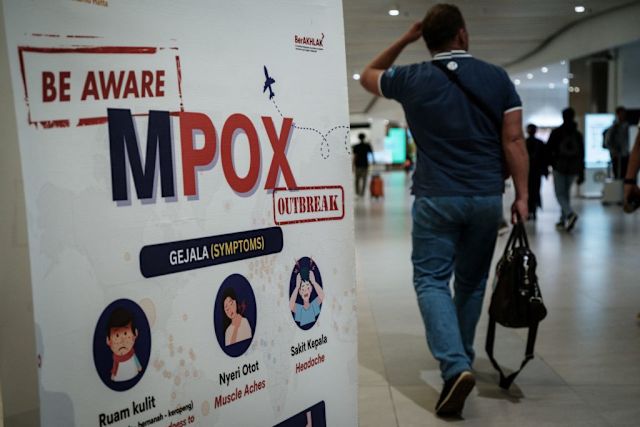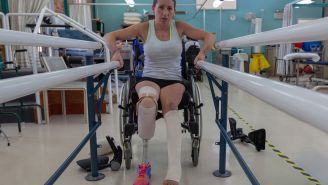Updated on June 20, 2025.
During the COVID pandemic, people around the world got a crash course in virology and epidemiology. Like it or not, we learned lessons in how bundles of genetic material can infect human cells, spread, and wreak havoc on the body in the process.
Since then, there have been other viral outbreaks across the globe—including that of mpox. Formerly called monkeypox, it was first identified in monkeys more than 60 years ago, and the first human case was confirmed in 1970.
Over the years, cases of mpox have been rare and typically concentrated in central and west Africa. But in May 2022, a worldwide outbreak began, eventually infecting more than 99,500 people in 115 countries where the virus doesn’t usually spread. This included the United States, where there were 32,063 confirmed infections and 58 deaths, according to the Centers for Disease Control and Prevention (CDC).
That 2022 outbreak was caused by an mpox strain called clade IIb. In 2024, another outbreak caused by the clade Ib mpox strain spread quickly in central and east Africa. Clade Ib infections are more contagious and more likely to be fatal than clade IIb infections, and in August 2024, the World Health Organization (WHO) declared a public health emergency of international concern (PHEIC) for the second time in two years. While only a small handful of cases ever reached the United States, officials have remained vigilant.
So, what is mpox, exactly? How does it spread? Can it be prevented? Here’s what to know.
Can you die from mpox?
It’s possible but unlikely—especially if you live in a country with adequate healthcare resources. The less serious strain responsible for the 2022 outbreak may kill about 1 percent of those infected. The strain responsible for the 2024 outbreak has a fatality rate of up to 10 percent. Outcomes also depend on variables, including a person’s health history. But most people recover fully on their own in two to four weeks.
If we’ve learned anything from COVID, it’s that we can’t always predict how a virus will behave. But the more we know about it, the better off we all are. Fortunately, scientists already know a lot about mpox. Understanding the virus and how it spreads can help you protect yourself and others.
Know the symptoms—and avoid exposure
Unlike COVID, which can spread even before someone knows they’re infected, mpox takes longer to become transmissible (usually about one to two weeks). Some could spread mpox to others from one to four days before they develop symptoms. But most people are symptomatic by the time this happens. So, in many cases preventative steps can be taken to stop its spread.
The early warning signs of mpox infection include fever, chills, headache, backpain, muscle aches and fatigue. The virus also causes swelling in the lymph nodes.
Usually within a few days (sometime longer), people also develop a rash. It may start on the face then spread to other parts of the body.
At first, the lesions will be flat. But over the course of a few weeks, they will become raised, blister, and fill with puss before scabbing up and falling off. Mpox can spread from the time that symptoms start until the rash is fully healed and new skin has formed.
How does mpox spread?
Mpox spreads mainly through close person-to-person contact, including sex. What does close contact include? Direct contact with mpox sores and the body fluids of someone who is infected. This includes semen. The virus can also spread through contact with contaminated materials, such as bedding, towels, or other fabrics and textiles.
Mpox also can be spread through respiratory droplets during prolonged, face-to-face contact. This includes intimate contact between people, such as during sex, or while kissing, cuddling, or touching parts of the body with mpox sores.
Mpox does not spread through casual conversations, or simply walking near or passing by someone out on the street or in a store. You also don’t get infected by casually touching everyday objects, like doorknobs, the CDC points out.
The virus can, however, cross a pregnant person’s placenta, infecting a fetus. And it can spread from infected animals to people through exposure to contaminated animal products, bites, scratches or by handling wild game.
How can mpox be prevented?
Being mindful about possible exposure and taking steps to protect yourself and others can help prevent more infections from happening. Aside from avoiding close contact with infected people, animals, or contaminated materials, it’s important to continue to practice excellent hand hygiene. Wash your hands well and often with soap and water for at least 20 seconds. If you do not have access to soap and water, use a hand sanitizer with an alcohol content of at least 60 percent.
Avoid sharing cups and utensils with people who are infected. Those with mpox should isolate themselves within their household to avoid contaminating common spaces, such as upholstered seating and blankets. If possible, those infected should not share a bathroom with other people until their infection has resolved.
If you are exposed to the virus, the vaccine used to eradicate smallpox could help protect against mpox. (No, mpox isn’t the same thing as smallpox. In this family of viruses, mpox is a less harmful cousin of smallpox.) In fact, one reason why mpox cases may be popping up is that routine smallpox vaccinations ended in 1972. So, immunity among the population may be waning.
The U.S. Food and Drug Administration (FDA) has approved the single-dose ACAM2000 vaccine and the JYNNEOS two-dose vaccine for the prevention of both smallpox and mpox. (The second dose of JYNNEOS should be given four weeks after the first dose.) Immunization can help prevent infections if given up to 14 days after exposure, though it’s ideally given within 4 days. Being vaccinated could also result in a milder mpox infection.
But the CDC does not recommend routine immunization against mpox. The vaccine is only for those considered to be at high risk of infection.
What else is being done?
The control of mpox and vaccination against the infection is critical to reduce the number of cases and deaths. Controlling mpox in Africa would effectively limit it’s spread to other parts of the world.
Here in the United States, the government closely monitors mpox outbreaks. Preparations are in place to detect and manage cases if they do occur.
Anyone with a rash that resembles mpox should talk to their healthcare provider (HCP). Even though most people will recover fully without treatment, those at higher risk for severe cases include:
- People with serious diseases or weakened immune systems
- Children younger than 8-years old
- Pregnant people or those who are breastfeeding
- Those with a history of certain skin conditions, including severe acne, eczema, burns, impetigo, varicella zoster (chickenpox), herpes simplex, and psoriasis.
- People at greater risk for complicated or serious mpox infections may be treated with an antiviral medication or VIGIV (vaccinia immune globulin intravenous).
The antiviral drug Tecovirimat (TPOXX) is FDA-approved for the treatment of smallpox. In certain cases, the CDC says it may be prescribed for people with mpox who are at high risk for severe infections.







